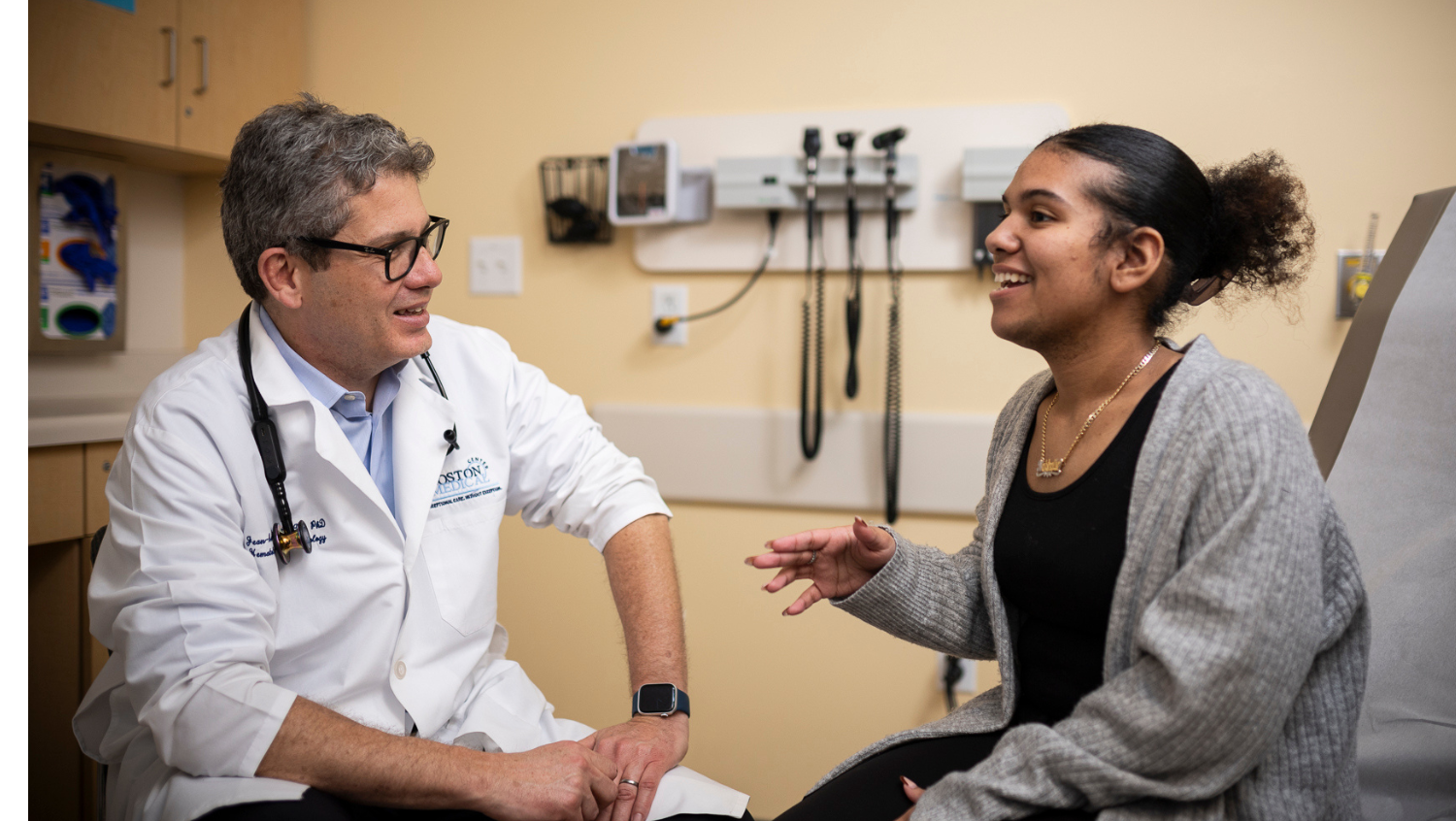BMC Is Primed to Deliver New Gene Therapies for Sickle Cell Disease, Beta Thalassemia
December 21, 2023

Boston Medical Center
Jean-Antoine Ribeil, MD, PhD speaking with his patient in the Center of Excellence in Sickle Cell Disease (Boston Medical Center).
Eligible patients in BMC’s Center of Excellence in Sickle Cell Disease may soon be relieved of debilitating pain through transformative gene therapies
“You never know where life is going to bring you,” says Jean-Antoine Ribeil, MD, PhD, a hematologist specializing in red blood cell disorders and who has, since arriving at Boston Medical Center (BMC) in 2021, been the clinical director of its Center of Excellence in Sickle Cell Disease. He is internationally recognized as a pioneering physician-scientist who has been a leader in realizing gene therapies for sickle cell disease (SCD) and other blood disorders. Now, with the U.S. Food and Drug Administration’s approval of two gene therapies for SCD on December 8, he’s standing on the edge of a new chapter, one which will dramatically change the treatment conversation for eligible patients who have historically been underserved.
Ribeil and his team now have approval to begin administering transformative gene therapies to select patients with sickle cell disease and beta thalassemia, another inherited blood disorder that affects hemoglobin. Pharmaceutical companies Vertex Pharmaceuticals and bluebird bio have both achieved FDA approval for gene therapies that can treat sickle cell disease and thalassemia by replacing the patient’s SCD-causing gene for hemoglobin. Each dose is custom-made using a patient’s unique cells.
Ribeil’s lifelong interest in studying red blood disorders and developing gene therapies to treat them has brought him across the Atlantic — from Necker University in Paris to the U.S., from the world of academic research to commercial development — and now finally to BMC, a decision he made because he wanted his role to be highly patient-centered. And at BMC, he says, he can most directly make a positive impact on patients.
“I came to BMC because this is where I can best help sickle cell disease patients and make gene therapy most accessible, by breaking down barriers that have, until now, prevented gene therapies from reaching vulnerable patients who need them.” he says.
Sickle cell disease and BMC’s patient community
Sickle cell disease is caused by a gene mutation that causes abnormal hemoglobin, the protein that carries oxygen in the bloodstream and in red blood cells. Because of the abnormal hemoglobin, red blood cells change their shape, forming crescent-moon-shaped curves that resemble a farming tool known as a sickle. These sickled cells die earlier than normal red blood cells, and they can get trapped in small blood vessels — causing pain and potentially life-threatening complications.
Ribeil had been working across the hospital to ensure that each of BMC’s different clinical teams and departments, along each step of gene therapy treatment process, were fully prepped and ready to begin treating eligible patients as soon as the FDA gave the green light.
“I believe these kinds of treatments, which at first seemed like science fiction and are now available to select patients, can eventually become a reality for every patient,” says Ribeil. “This is my goal — to make transformative therapies available to all patients, especially the patient populations that BMC serves.”
BMC is the No. 1 hospital in the U.S. for racial inclusivity and serving people of color, securing the top spot among 3,142 hospitals nationwide ranked by the Lown Institute Hospital Index for Social Responsibility. At BMC, more than 70% of patients identify as persons of color. In 1972, when BMC opened the Center of Excellence in Sickle Cell Disease, the Center was one of the first of its kind.
In the U.S. sickle cell disease affects people of African descent at significantly higher rates than other racial and ethnic groups. Research indicates the gene mutation for sickle cell disease, which ironically imparts some protection against malarial disease, first began proliferating in people living in Africa thousands of years ago. Now, according to the Centers for Disease Control and Prevention (CDC), the sickle cell gene appears in one out of every 13 Black or African American babies born in the US.
A foundation of sickle cell care at BMC
For BMC’s patients with sickle cell disease, who have come to know the Center of Excellence in Sickle Cell Disease’s expertise and commitment to their care, Ribeil hopes it will be reassuring that they can access these innovative new treatments in the comfort of the same medical center and with the same team of providers that has been managing their care all along.
“Everyone at BMC knows sickle cell disease very well, from the mechanisms of the disease itself to the population of patients this blood disorder predominantly impacts,” Ribeil says. “And I don’t believe this culture of appreciation and dedication to the sickle cell disease community is the same across all hospitals.”
Ribeil’s team is not only poised to treat patients with recently approved gene therapies for SCD, but is also leading the way in research that will continue to generate new treatment options for sickle cell and other red blood cell disorders.
“We’re very happy with what we’re doing now in gene therapy to help our patients, but as good providers and researchers, we are always looking to improve and to move forward to make things better and easier for our patients, always,” Ribeil says.
For example, he says, the team is leveraging new small molecule therapeutic candidates that are available. The purpose of that research is to make the treatment process much easier for patients living with SCD. But beyond this patient community, Ribeil has a bigger vision to help people living with other chronic diseases with expert providers, relationship building, biotechnology collaborations, and patient-centric research efforts that have been put in place for SCD gene therapies. This moment, he says, is only the beginning: “My longer goal is to help expand access to transformative gene therapies beyond hematology, to help patients living with diseases that affect other tissue types.”


